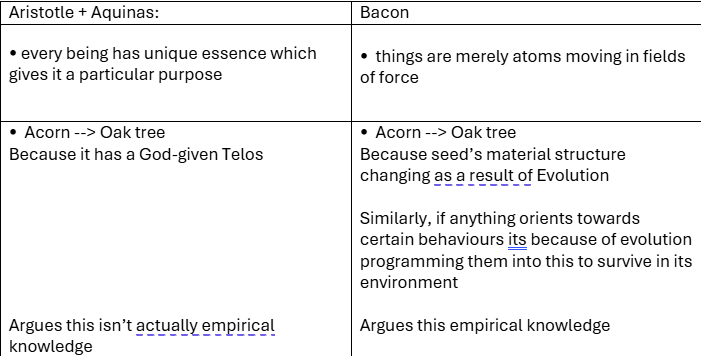Whether or not the universe is designed with a Telos, or human nature has an orientation towards the good
1/3
There's no tags or description
Looks like no tags are added yet.
Name | Mastery | Learn | Test | Matching | Spaced | Call with Kai |
|---|
No analytics yet
Send a link to your students to track their progress
4 Terms
(Para 1) Argument FOR
Telos-based ethics are empirical - based on evidence (a posteriori argument):
Aristotle observed that everything has a nature which inclines it towards a certain goal which he and Aquinas called its telos. A biological fact that certain behaviours cause an organism to flourish. Telos thus seems an empirically valid concept.
eg Aristotle observed that…
An acorn grows into an oak tree.
Eyes are for seeing.
Humans use reason, pursue knowledge, form societies.
so must have some sort of telos (related to William Paley’s Teleological Argument)
(Para 2) Argument AGAINST
McGrath:
says Nature isn’t self-interpreting. Observation filtered through conceptual lenses -
A believer may see order, direction, and telos; others may see blind/random processes. Both are looking at the same natural world.
nature is not shaped by the assumptions of the observer - Aristotle + Aquinas conclusion based on empirical evidence is skewed
Another argument AGAINST
Francis Bacon ‘father of empiricism‘:
• Material + Efficient causes were valid scientific concepts
• Formal + Final causes were NOT
ie. Modern science can explain world without Telos - unnecessary explanation
Arguing that formal + final causes isn’t empirical evidence whatsoever

Argument defending telos
Polkinghorne - argued science is limited, cannot answer all questions. eg. Science can tell us what universe is like but not why it is this way (nor why it exists). So cannot answer question about purpose
His argument is successful because science cannot rule out idea of a Prime Mover or God which could provide some sort of Telos; If purpose existed, science not able to discover it —> cannot dismiss existence of purpose.